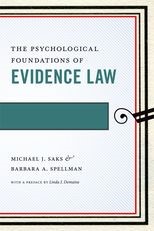The Psychological Foundations of Evidence Law
The Psychological Foundations of Evidence Law
Cite
Abstract
Trials are supposed to be not only fair and accurate but also efficient. Evidence law is meant to facilitate trials, and, at the same time, to encourage and protect important societal values and relationships. In pursuit of these goals, those who create the rules (i.e., common-law judges and modern drafting committees) must engage in amateur applied psychology. Their task requires them to employ what they think they know about the ability and motivations of witnesses to perceive, store, and retrieve information; about the effects of the litigation process on testimony and other evidence; and about people's capacity to comprehend and evaluate evidence. These are the same phenomena studied by cognitive psychology and social psychology. Further, psychology examines the role of emotion, credibility, expert influence, and other relevant topics. The rules of evidence restrain lawyers from using the most robust weapons of influence, and direct judges to exclude certain categories of information, limit it, or instruct juries on how to think about it. The Psychological Foundations of Evidence Law draws on the best current psychological research to identify and evaluate the choices implicit in the rules of evidence, and suggest alternatives that psychology reveals as more likely to accomplish the law’s goals. This interdisciplinary book is aimed at lawyers, judges, researchers, and students, and seeks to provide all with a better understanding of the psychology of what is perhaps the most psychologically connected of legal subjects.
-
Front Matter
-
Introduction: The Crossroads of Psychology and Evidence Law
-
Part I Minding the Jury
-
Part II Judging the Witness
-
Part III Other Types of Evidence
-
End Matter
Sign in
Personal account
- Sign in with email/username & password
- Get email alerts
- Save searches
- Purchase content
- Activate your purchase/trial code
Institutional access
-
Sign in through your institution
- Sign in with a library card Sign in with username/password Recommend to your librarian
Institutional account management
Sign in as administratorPurchase
Our books are available by subscription or purchase to libraries and institutions.
Purchasing information| Month: | Total Views: |
|---|---|
| November 2022 | 1 |
| January 2023 | 2 |
| January 2023 | 1 |
| September 2023 | 1 |
| September 2023 | 1 |
| September 2023 | 2 |
| September 2023 | 1 |
| September 2023 | 3 |
| October 2023 | 3 |
| November 2023 | 1 |
| January 2024 | 3 |
| February 2024 | 2 |



Get help with access
Institutional access
Access to content on Oxford Academic is often provided through institutional subscriptions and purchases. If you are a member of an institution with an active account, you may be able to access content in one of the following ways:
IP based access
Typically, access is provided across an institutional network to a range of IP addresses. This authentication occurs automatically, and it is not possible to sign out of an IP authenticated account.
Sign in through your institution
Choose this option to get remote access when outside your institution. Shibboleth/Open Athens technology is used to provide single sign-on between your institution’s website and Oxford Academic.
If your institution is not listed or you cannot sign in to your institution’s website, please contact your librarian or administrator.
Sign in with a library card
Enter your library card number to sign in. If you cannot sign in, please contact your librarian.
Society Members
Society member access to a journal is achieved in one of the following ways:
Sign in through society site
Many societies offer single sign-on between the society website and Oxford Academic. If you see ‘Sign in through society site’ in the sign in pane within a journal:
If you do not have a society account or have forgotten your username or password, please contact your society.
Sign in using a personal account
Some societies use Oxford Academic personal accounts to provide access to their members. See below.
Personal account
A personal account can be used to get email alerts, save searches, purchase content, and activate subscriptions.
Some societies use Oxford Academic personal accounts to provide access to their members.
Viewing your signed in accounts
Click the account icon in the top right to:
Signed in but can't access content
Oxford Academic is home to a wide variety of products. The institutional subscription may not cover the content that you are trying to access. If you believe you should have access to that content, please contact your librarian.
Institutional account management
For librarians and administrators, your personal account also provides access to institutional account management. Here you will find options to view and activate subscriptions, manage institutional settings and access options, access usage statistics, and more.